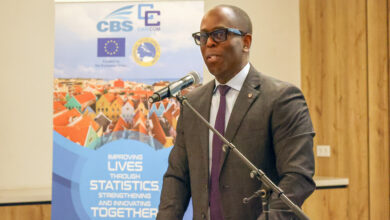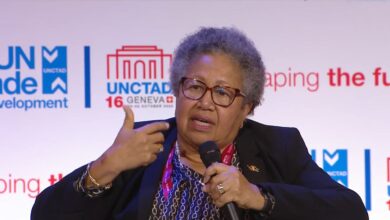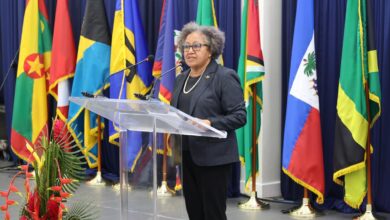Small Island Development States (SIDS) were praised during the yesterday’s Global Celebration of World Environment Day 2014 for the front line position they have taken to fight the disastrous effects of climate change. Barbados had the opportunity to be in the spotlight as host to the international event attended by officials from the United Nations System, Secretary General of CARICOM Ambassador, Irwin La Roque, and regional Prime Ministers.
Apart from demonstrating its ability to host such an event, the country was also lauded for being a stellar example and leading the way in climate change adaptation in the region.
United Nations Resident Coordinator for Barbados and the OECS, His Excellency Stephen O’Mallay, in his address remarked that SIDS played an important role in protecting the oceans and many were biodiversity hot spots containing some of the richest reservoirs of plants and animals on the planet.
Despite having these assets, he lamented many of the challenges which the small islands faced, notably, their remoteness which affected their ability to be part of the global supply chain, increased import costs especially for energy and their competitiveness in the tourism industry.
He posited that many of the small states were increasingly vulnerable to the impact of climate change and were devastated by storms that threatened sea level rise. SIDS, he stated, contributed little to climate change in that their combined greenhouse gases was less than 1 per cent of the world’s emissions. Nevertheless, their position on the front line had projected many to the fore in negotiations for a universal new legal climate agreement in 2015, the UN official asserted.
Minister of Environment, Dennis Lowe, made the point during that ceremony that the foundation of the local economy was being shaken by the impacts of climate change and that according to recent research, climate change was set to have a considerably negative effect on the economy and national development agenda. Notwithstanding that threat, he outlined several initiatives which the government of Barbados had embarked upon to limit the adverse effect climate change could have on our environment.
Coastal Management
Of those initiatives, he mentioned the now completed 2002 Coastal Infrastructure Project and the 2011 Coastal Risk Assessment and Management Programme (CRMP).
“Our coasts are critical economic assets and must be protected from risks associated with climate change,” the Minister said, as he cited the most visible manifestation of those coastal interventions as the two coastal boardwalks – the Richard Haynes Boardwalk on the south coast and another on the west coast which is currently being under taken.
Prime Minister Freundel Stuart, who was the feature speaker at yesterdays WED 2014 ceremony, also highlighted efforts on the international front with Barbados in which Barbados was looking to engage.
Barbados, he noted, would be involved in the next meeting of the Conference of Parties to the United Nations Framework Convention on Climate Change to be held in Peru later this year. Prime Minister Stuart said that he hoped that event would be a forum to resolve climate change issues which were still on the table, including obtaining support from the international community to undertake urgent adaptation action on the ground in SIDS.
The Prime Minister also remarked that Barbados would be joining its partners in the developed world in the upcoming United Nations Special Summit on Climate Change to be held in September and asserted the country’s desire to continue to work together to address relevant issues.





